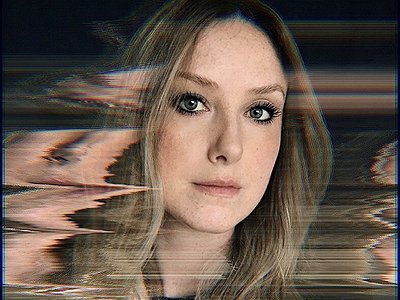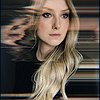Part 2
Collaborations can take on many forms. What role do they play in your approach and what are your preferred ways of engaging with other creatives through, for example, file sharing, jamming or just talking about ideas?
Creative collaboration: Having only collaborated with a handful of artists in the past, it has most often been challenging for me. I tend to be fairly introverted and stubborn when it comes to my creative process, not really wanting feedback from those that aren’t close to me, and not wanting to lose my creative freedom. I emotionally benefit most from creating without predetermined ideas - just doing and seeing what happens.
Performance Collaboration: I’ve performed live visuals at numerous events and festivals as well as alongside individual artists, which technically is a form of collaboration, but I maintain creative control over my visuals. I do, however, collaborate with my husband when we perform live sets together. When we’re preparing for an upcoming gig, for example, I will compose and program visuals to have a stronger reaction to certain frequencies, also that of choosing specific visuals and colors I think best fit to each track. He will seek out more extreme frequency diversity in his music to greater affect my visuals, but we both maintain our individual creative control.
Could you take us through a day in your life, from a possible morning routine through to your work? Do you have a fixed schedule? How do music and other aspects of your life feed back into each other - do you separate them or instead try to make them blend seamlessly?
While I was in the US, a typical day was working nine-plus hour days, five to six days per week, and usually coming home too tired to do anything creative. Among bouts of creativity here and there, I would regularly reserve at least one weekend day for creativity - I absolutely love waking up on a Saturday, making coffee, and immediately jumping into composing, not caring about the passage of time, just existing in my creative world. Because I cherish the psychological benefits of my creativity, I keep it strictly separate from work. When I’m forced to complete something creative within a timeframe, or if I’m forced to create based on a predetermined idea, I most often lose my creative footing and lose the therapeutic aspect of it. It’s no longer enriching at that point, it’s just work.
Having moved to Germany, my days have definitely changed. For the duration of 2019 I attended intensive German language courses while keeping my free time for composing and becoming accustomed to the new culture. My then-fiancé-now-husband and I did a lot of exploring of my new hometown Cologne, and of several surrounding countries. It was incredibly inspirational and contributed to the creation of Antecedent, which was written and produced during that time.
Life has since been interrupted due to the Covid-19 pandemic, so a typical day is not so typical. It's extremely challenging to remain creative and I feel conflicted about sharing my art and music with the public during this time. On one hand, completing an album is a wonderful accomplishment that I’m proud of. I hope people can view my art as a peaceful distraction from everything that’s happening in the world. On the other hand, it feels selfish, as if I’m saying “I have the luxury of being able to create something while so many people are literally struggling to get by”. It’s difficult to find the balance.
Could you describe your creative process on the basis of a piece or album that's particularly dear to you, please? Where did the ideas come from, how were they transformed in your mind, what did you start with and how do you refine these beginnings into the finished work of art?
I’ll speak of my album Antecedent. I didn’t have the desire or goal to write an album. I’ve been writing music for over two decades, so you can imagine how many folders of unfinished tracks I have. The rediscovery of my musical voice lead to creative ideas flooding out of me and I was quickly filling up my 2019 folder of unfinished tracks and ideas. After a few months of showing song ideas to my husband, he encouraged me to choose my favorites and to really work them through to create a finished collection.
The creative process was purely my creative expression. Focusing on production initially proved difficult due to feeling like I was forcing myself to complete something creative, but it luckily became exciting as my production awareness had progressed over the years and I was able to structure my music in a way that I was ultimately satisfied with. Refining into finished pieces will always be a never-ending struggle. Even listening to a few tracks from the album now, I think - “Oh no, that sound comes in too quickly” or “That sound is way too harsh”. I either refine a track to an acceptable level of my quality control, or I get tired of re-listening to it and ask those closest to me if it’s good enough to say that its finished.
There are many descriptions of the ideal state of mind for being creative. What is it like for you? What supports this ideal state of mind and what are distractions? Are there strategies to enter into this state more easily?
I don’t believe there is an ideal state of mind for being creative, but that creativity itself creates that ideal state of mind, thus allowing creativity to thrive in it. Like a feedback loop. Nevertheless, it’s a relevant reason why I find it important to jump on creative impulses and to use that energy to be creative for as long as possible.
Like many others, my creativity comes in waves and I will sometimes go months without making anything new. When in a creative lull I will either do my best to remind myself that it's ok to take a break; or if I’m feeling emotionally off, I will sometimes sit myself in front of my computer and open up an old track, just to tinker around. Sometimes the tinkering will lead to new ideas, sometimes it won’t. But it's the effort that will most often bring me out of a lull. The act of creating creates the state of mind.
How is playing live and writing music in the studio connected? What do you achieve and draw from each experience personally? How do you see the relationship between improvisation and composition in this regard?
I have a different experience with this because I have yet to perform music live. I do, however, perform live-generated audio-reactive visuals. In contrast to my music production, I specifically create my visuals to be experienced in a live format. For example, I connect various parameters of a visual to an incoming audio source, splitting the frequencies, so the visual will grow, shine, or move based on what it “hears”. I also control several parameters in real-time, so the programming I do while composing is basically setting accessible limits to those parameters.
As for a live music performance, I understand the structural concept that could go into a live set, but I’ve yet to work on one. I also haven’t looked for software or equipment that I could benefit from in a live setting. To implement a live music performance with an already established live visual performance is a huge challenge for me. I will have to find balance in what to automate and what to perform visually and musically.
How do you see the relationship between the 'sound' aspects of music and the 'composition' aspects? How do you work with sound and timbre to meet certain production ideas and in which way can certain sounds already take on compositional qualities?
Sound and music can be one of the same, depending on context and who interprets it. It’s up to the listener to decide.
I work with sound by pushing it in all directions until it sounds interesting to me. I like to fill the sonic space to the brim with sounds that evoke feeling within myself. I also gravitate towards organic movement within sound. In some of my ambient tracks I’ll push a sound or chord out of the time signature or past an instinctual cutoff point to kind of play with the subconscious. Other tracks are repetitive, but slowly changing and growing into large soundscapes, or have sounds repeating in different time signatures apart from the main synths. It’s like a cosmic dance, by meaning of all elements, atoms, particles, etc. In the natural world seen at a glance as a giant mess, but somehow all working in unison.
Our sense of hearing shares intriguing connections to other senses. From your experience, what are some of the most inspiring overlaps between different senses - and what do they tell us about the way our senses work? What happens to sound at its outermost borders?
Sound has always been directly connected to emotion. I think there is something primitive about that concept and can be considered when thinking of, for example, subconsciously hearing your parent’s heartbeat while in the womb - comfort, elation, safety. Also as a means of communication or celebration, sound can speak to a range of emotions. Music and sound can transport my consciousness into another state of being, focus, and emotion, but is also connected with the physicality of humans as well, not just the senses. Modern studies show that music can lower blood pressure, slow heart rate, reduce levels of stress hormones, enhance the function of neural networks, etc.
I also find the overlap of sound and visual senses interesting to explore with my visual art. It becomes a new experience when I can not only audibly share a piece of myself, but visually as well. Our visual sense also speaks to a range of emotions - films transport us into stories and we can feel how the characters feel, literature can transport us into our imagination, etc. All in all, everything is connected and all of our senses work together to create the environment in which we experience life.
Art can be a purpose in its own right, but it can also directly feed back into everyday life, take on a social and political role and lead to more engagement. Can you describe your approach to art and being an artist?
Based on my experience with ignoring, then rediscovering my inner musical voice, my future approach to art will always be personal and nonconforming. It loses its unique value and therapeutic aspects when I try to express something that doesn’t come naturally. My approach as an artist is, I suppose “Here’s my art. It’s cool if you like it and super cool if it makes you feel something, but it’s also cool if you don’t like it.”
It is remarkable, in a way, that we have arrived in the 21st century with the basic concept of music still intact. Do you have a vision of music, an idea of what music could be beyond its current form?
I believe the basic concept of music will always remain intact and will never devolve away from our humanity. It’s part of our DNA, so to speak. Some research supports the idea of music being an earlier form of communication than language, and language in itself can be defined as music - cadence, melody, timbre. As for what music could be beyond it’s current form. I really have no idea, but I believe it will continue to evolve with us.






